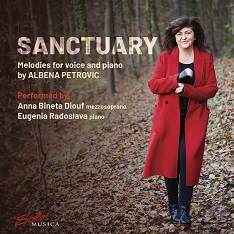Auf diesem Album Sanctuary von Albena Petrovic entdeckt der Zuhörer 12 Lieder nach Texten von Peter Thabit Jones, Else Laske Schuler, Friedrich Nietzsche, Egon Schiele und Albena Petrovic.
Die Komponistin benutzt Texte, die (außer ihren eigenen) am Anfang des 20. Jahrhunderts geschrieben wurden und die, wie der Titel es vermuten lässt, sakrale, humanistische und pazifistische Botschaften vermitteln. Die Texte sind klug ausgewählt und Petrovics Musik passt hervorragend dazu. Jedem Lied einen speziellen Charakter verleihen ist gerade in der zeitgenössischen Musik nicht immer einfach. Doch Albena Petrovic erweist sich hier als versierte Komponistin und schafft mit jedem Lied einen eigenen Kosmos. Das ist wirklich hochkarätig. Und für hochkarätige Musik braucht man hochkarätige Interpreten. Und in diesem Punkt krankt dieses Album ein wenig.
Die Pianistin Eugenia Radoslava agiert allerdings sehr feinfühlig und lotet die Musik bis ins kleinste Detail aus. In ihrer Interpretation wird wunderbar phrasiert oder scharf attackiert, es werden Farben erschaffen und verändert, Stimmungen beschworen und in Frage gestellt. Bei dieser Vielfalt an pianistischem Ausdruck hätte es einer ebenbürtigen Sängerin bedurft.
Leider ist die deutsch-senegalesische Mezzosopranistin Anna Bineta Diouf keine ideale Interpretin für dieses Repertoire. Die Stimme ist unflexibel und wirkt schlecht kontrolliert, sie flackert und tut in den Spitzentönen manchmal weh, zumindest, in einigen Liedern. Doch man merkt der Sängerin ihre Bemühungen um Gestaltung und Phrasierung an. Und vieles gelingt ihr auch sehr gut. Es gibt sehr innige und intensive Momente, die tief empfunden sind und sie als eine engagierte Interpretin ausweisen. Aber Biouf ist leider nicht zu einer gleichbleibenden Leistung fähig, so dass ihr Gesang immer zwischen schön und schrill hin- und herwechselt.
Schuld daran ist aber auch die Aufnahmetechnik. Wie kann ein Produzent oder Aufnahmeleiter eine Sängerin so bloßstellen? Es gibt zudem keine nachvollziehbare Kommunikation zwischen Klavier und Gesang; doch während das Klavier ziemlich gut und räumlich eingefangen ist, hat man den Eindruck, die Sängerin würde dem Hörer direkt ins Ohr singen.
Trotz aller Einwände, die andere vielleicht nicht so stark erleben, ist Sanctuary von Albena Petrovic ein hörenswertes Album.
On this album Sanctuary by Albena Petrovic, the listener discovers 12 songs based on texts by Peter Thabit Jones, Else Laske Schuler, Friedrich Nietzsche, Egon Schiele and Albena Petrovic.
The composer uses texts written at the beginning of the 20th century (apart from her own), which, as the title suggests, convey sacred, humanist and pacifist messages. The lyrics are cleverly chosen and Petrovic’s music fits them perfectly. Giving each song a special character is not always easy, especially in contemporary music. But Albena Petrovic proves to be an accomplished composer and creates her own cosmos with each song. This is really top class. And for first class music you need first class performers. And in this respect this album suffers a bit.
The pianist Eugenia Radoslava, however, plays with great sensitivity and explores the music down to the smallest detail. Her interpretation is wonderfully phrased or sharply attacked, colors are created and changed, moods are evoked and questioned. This variety of pianistic expression would have required an equal singer.
Unfortunately, the German-Senegalese mezzo-soprano Anna Bineta Diouf is not an ideal interpreter for this repertoire. Her voice is inflexible and seems poorly controlled, it flickers and sometimes hurts in the high notes, at least in some songs. But you can hear the singer’s efforts to shape and phrase. And she succeeds very well sometimes. There are very intimate and intense moments that are deeply felt and prove her to be a committed interpreter. Unfortunately, Biouf is not capable of a consistent performance, so that her singing alternates between beautiful and shrill.
The recording technique is also to blame. How can a producer or recording manager expose a singer like this? There is also no comprehensible communication between the piano and the vocals; but while the piano is captured quite well and spatially, one has the impression that the singer is singing directly into the listener’s ear.
Despite all objections, which others may not feel as strongly, Sanctuary by Albena Petrovic is an album worth listening to.




















